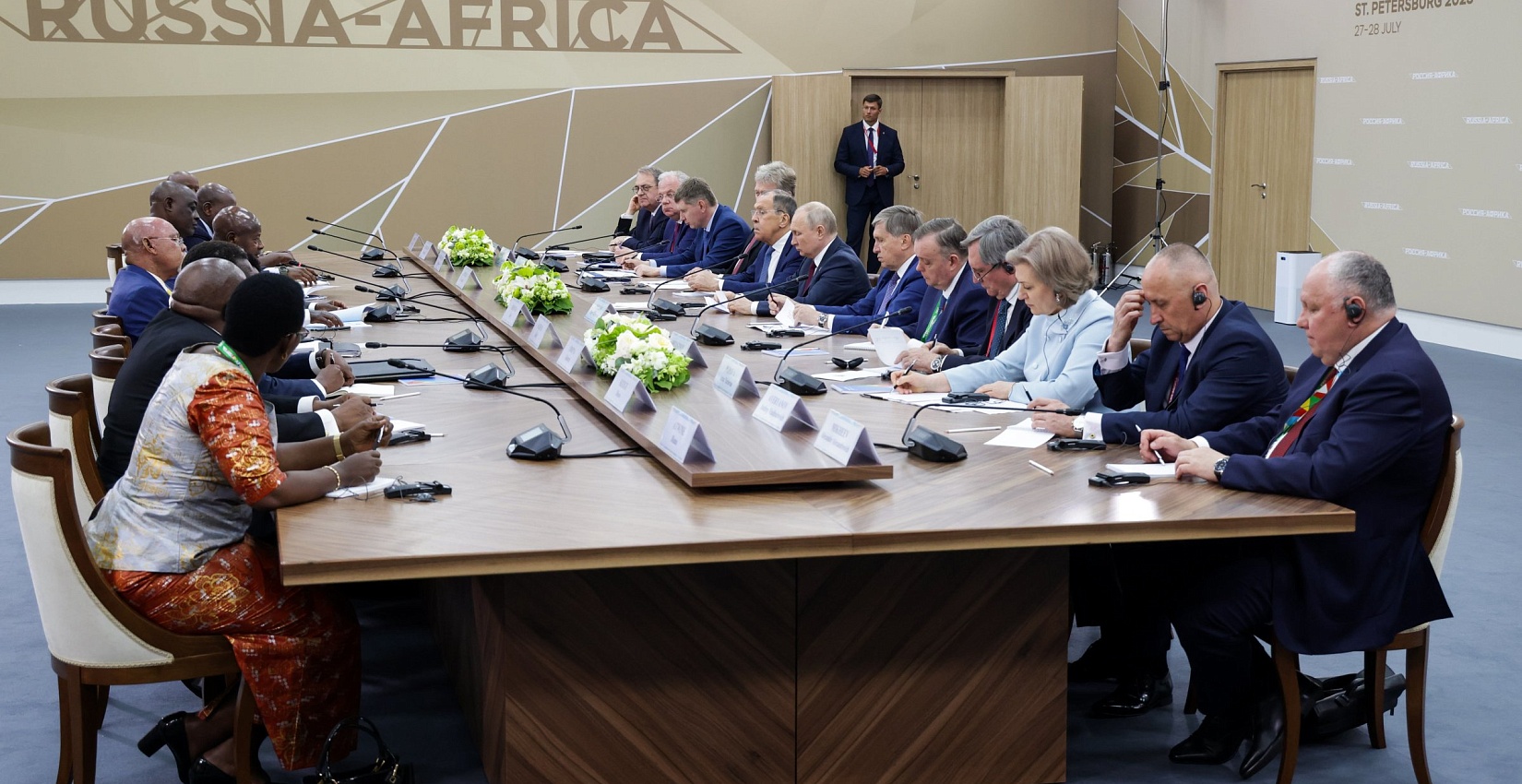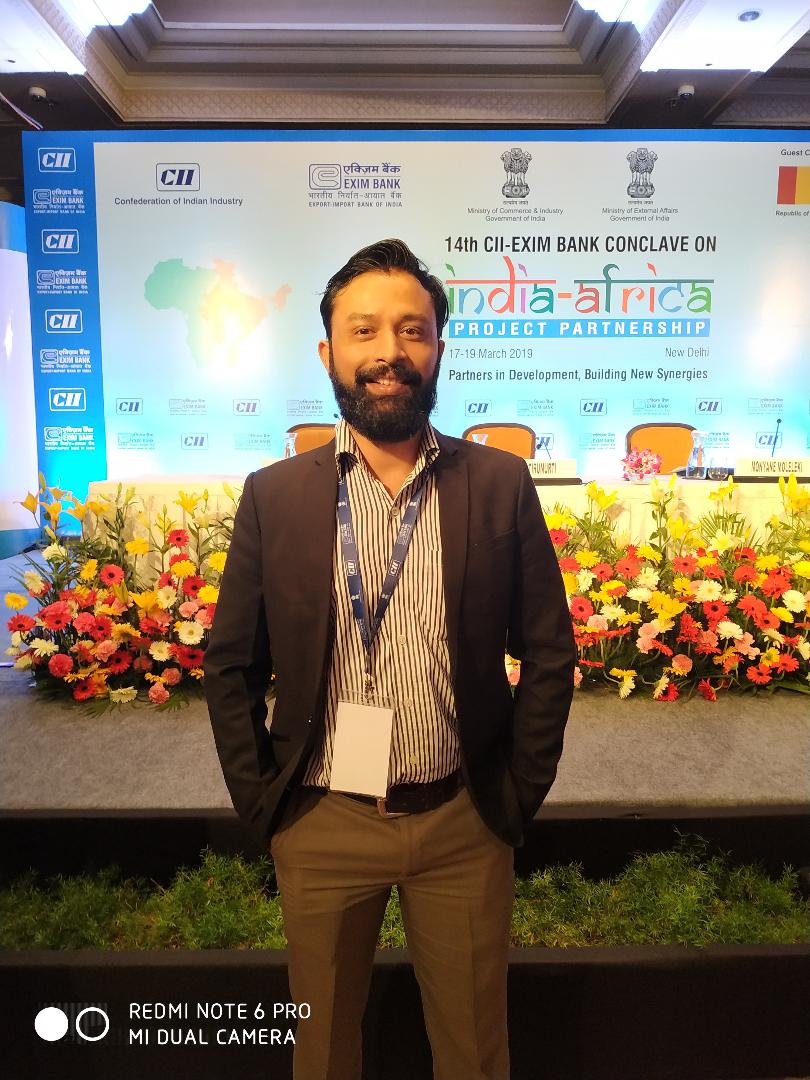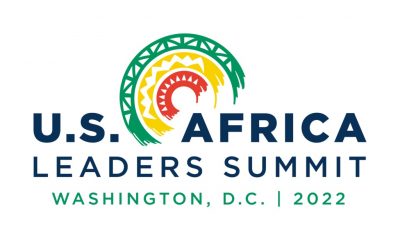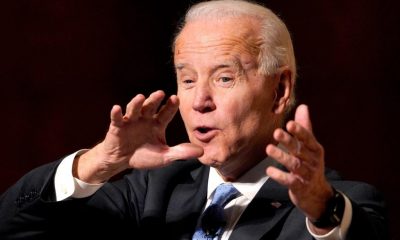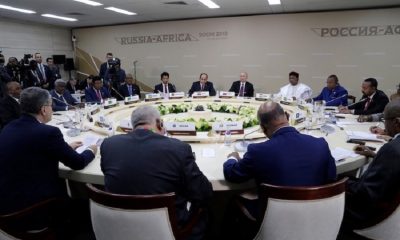World
Russia’s Engagement in Africa Requires In-depth Study
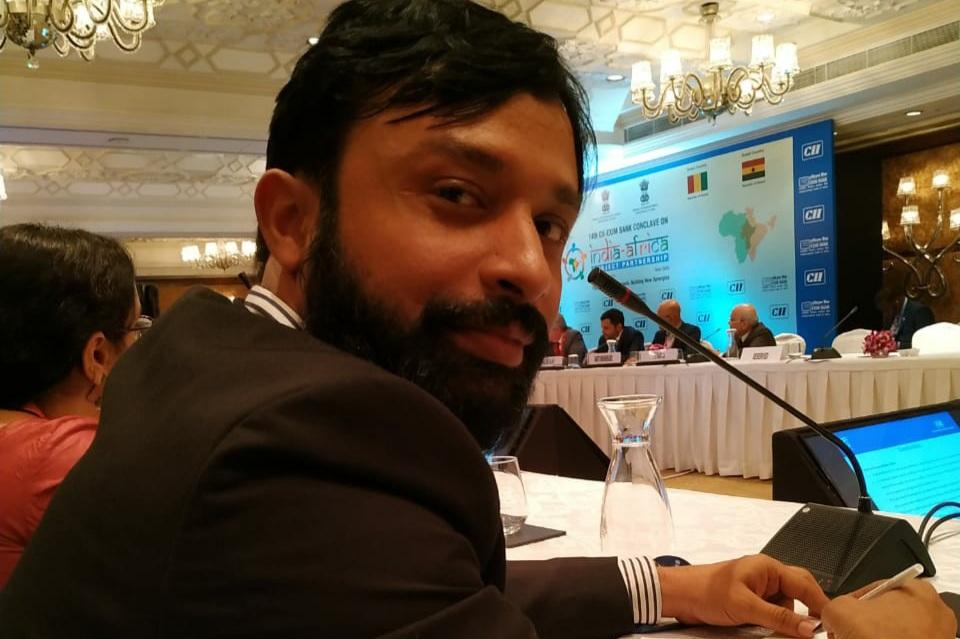
Kestér Kenn Klomegâh
Within the current geopolitical changes, Africa is experiencing sharp disintegration characterized by differences in political systems, economic structures and cultural norms in member countries. Unfortunately, military takeovers have become a distinctive feature (or accepted form) of regime change, particularly in West Africa. For instance, the Africa Governance Report 2023 focuses on unconstitutional changes of government in Africa.
The 35th Ordinary Session of African Leaders Summit, held in February 2022, urged leaders to deploy concerted efforts in promoting democracy and good governance, including upholding term limits, as per their respective constitutions. The Accra Forum II also underscored the commitment to facilitate the consolidation of constitutionalism in Africa through stakeholder engagement.
The Malabo, Equatorial Guinea, summit declaration (April 2022) further urges the African Union (AU) Member States, the Peace and Security Council (PSC) of the AU and the Regional Economic Communities especially ECOWAS, to strictly adhere to what was referred to as the Lomé Declaration and the Johannesburg Declaration on ‘Silencing the Guns’ in Africa, adopted at the 14th Extraordinary Session on 6 December 2020.
The declaration warned external partners collaborating and supporting military governments to hold onto political power. Given the case of and with particular reference to Russia, it condemned external interference in peace and security matters in Africa. In addition, African leaders have expressed grave concern over the resurgence of military takeovers and further urged the adoption of serious measures to intensify efforts at addressing the root causes of coup d’etats.
In this interview, Samir Bhattacharya, an Associate Fellow at Observer Research Foundation (ORF), where he works on geopolitics with particular reference to Africa in the changing global order, says Africa has witnessed six military takeovers since 2022, with several abortive coups, sanctions on the military juntas have been lifted but generally the French-speaking West African countries continue to face multiple democratic challenges with a wider negative impact across the region. Here are the interview excerpts:
To begin with, what are your arguments that Russia supports military coup makers (Burkina Faso, Mali, Niger et cetera) in Africa?
It is true that the Russian Private Military Company (PMC) Wagner Group provided political advice to many African leaders throughout the continent, particularly in Sudan, and had offered military support to weak authoritarian governments in nations like Mali and Libya, primarily to combat extremist organizations and insurgencies. The Western experts also emphasized how Russia frequently portrays Africa as a victim of neocolonialism and how it often supports or forms partnerships with autocrats who usually advance anti-Western regimes.
For instance, the Niger coup occurred precisely during the time Russian President Vladimir Putin was in Saint Petersburg receiving the Heads of State and ministries from Africa. There are no coincidences in politics. The president of Ukraine’s advisor, Mykhailo Podolyak, was prompted by this to openly accuse Russia of masterminding the coup. Suspicion was aroused by the coup’s timing as well as the Russian flags being flown in the streets in the days that followed.
The narrative that depicts Russia as a proactive coup advocate is compelling and seems to hold water. Nevertheless, it is based on unsubstantiated hypotheses and ignores what Russia has done to help the junta leaders in the nations where it has started to contribute. Naturally, there are claims of human rights violations followed by denials. Nobody has, however, attempted to investigate if the Wagner group attempted to impose a Russian model of governance on these junta officials.
Wagner most likely wants to promote an African style of governance by demonstrating that it is not interfering in any way beyond its duty as a security provider. My point here is that we need to study Wagner in more detail before parroting what some Western media people are repeating.
Russia is seemingly interested in military governance in Africa. Does that set the precedence for future military takeovers in Africa?
Indeed, Western observers continue to be upset by Moscow’s relative popularity in coup-hit Africa. Most African scholars from North America or Europe indeed seem emphatic that not only does Russia support military coup makers, but a greater Russian engagement would also lead to more coups across the continent. Regretfully, there is hardly any empirical evidence to support these general statements. Therefore, it’s crucial to pay attention to what is happening on the ground rather than succumbing to their narratives and attempting to formulate morally sound responses in support of these arguments.
Do transitions from democratic governance to military governments have meaning for fighting growing trends of neo-colonialism in Africa?
Coups can spread quickly. Many observers warned about Burkina Faso when Mali collapsed, and many predicted that Niger would follow when Burkina fell.
Frustration over the government’s inability to put an end to terrorism and other instability in the Sahel region is the driving force behind all of these coups. Russia seems to appeal to a lot of African sentiment when it attempts to position itself as an anti-colonial power.
However, it would be overly generalizing to attribute the coup to neo-colonialism alone. With eight coups in three years, the Sahel region in West Africa is most affected by coups. However, a close examination reveals that the Sahel Region has endured violent extremism, civil unrest, and poor governance for a very long period. It unmistakably shows how France and other Western powers are losing ground in this region. Frustration with France and other foreign powers increased fairly naturally as their military intervention failed to stem the Islamist insurgency that was spreading throughout the region.
Therefore, the West cannot address the issue merely by blaming Russia. And Russia cannot blame only neocolonialism. I am afraid as many African nations continue to be beset by widespread complaints of poor governance, nepotism, and distress, many more within the region and beyond may eventually see military takeovers of a similar nature.
Despite the above narratives, do you think ECOWAS, the 15-member regional economic bloc, must be firm with the ‘Silence-the-Guns’ policy adopted several years ago by the African Union?
The African Union has presented its flagship project, “Silence the Guns by 2030,” which is also an essential component of “Africa’s Vision 2063,” to establish an Africa free of conflicts. However, following the COVID-19 pandemic in 2020, African leaders decided to concentrate more on other concerns, like the security of food and energy. As a consequence, the 2020 deadline for “Silencing the Guns” has finally been moved to 2030.
And ECOWAS, one of the earliest regional organizations, must take the initiative and maintain its resolve. But it must demonstrate that it is capable of acting. Its image has been tarnished during the recent coup in Niger when the ECOWAS threatened the Junta government with military action in favour of a return to the democratic government before reversing course. Furthermore, claims have been made that France controls ECOWAS. In light of the circumstances, ECOWAS needs to take action in the interest of the continent and restore its reputation as a powerful regional organization.
A research report from the South African Institute of International Affairs (SAIIA) describes Russia as ‘a virtual investor’ in Africa, most of its pledges largely aimed at luring (woo-ing) African states and leaders to support its ‘special military operation’ in Ukraine. What are your expert arguments here?
I have not read the report. However, the “African agency” is the most prominent victim in the narrative outlined above. It presents Russia as an all-powerful force that supports the overthrow of elected governments, many of which have the backing of the West and seeks to woo or persuade its allies into following its lead or “corrupting” them in the process.
Russia has not been in Africa for nearly thirty years, ever since the fall of the Soviet Union. When Russia hosted the first Russia-Africa Summit in 2019, many people believed it would only add to the already many Africa+1 conferences without offering anything new. However, the pace at which Russia is gaining ground in Africa has startled Western academics. Russia has been more politically and economically involved in Africa in recent years. But in this particular case, one private military group—the Wagner Group, as we all know it—has spearheaded the most successful kind of engagement on behalf of Russia, as opposed to a government-to-government or business-to-business model.
Since late 2017, Wagner’s military presence in Africa has increased significantly. Troops have been stationed in Sudan, Libya, Mali, Mozambique, Burkina Faso, and Mali, and the company is actively seeking to expand into several more states. Nevertheless, it still cannot compete with China, the US, or the EU in terms of physical infrastructure.
In practical terms and compared to China, do you think Russia has made a visible impact on infrastructure development in the continent since the collapse of the Soviet era in 1991?
Africa currently has a $12 billion trade deficit with Russia because it imports five times as much as it exports. President Putin vowed to boost Russia’s trade with Africa from approximately $16.8 billion to $40 billion yearly in five years following the 2019 Russia-Africa Summit.
Currently, it remains stagnant at roughly $18 billion each year, representing 2% of the total trade on the continent. Furthermore, two-thirds of Russia’s overall trade with Africa is confined to merely four countries. They are Algeria, Egypt, Morocco, and South Africa.
On the other hand, China is Africa’s largest trading partner for 15 consecutive years. South Africa is China’s largest trading partner among all African economies, accounting for 19.9 per cent of total trade with the continent, followed by Nigeria and Angola. China’s total trade with Africa grew by 1.5 per cent in 2023 from 2022 to $282.1 billion. Chinese exports to Africa reached $173 billion, an increase of 7.5 per cent over 2022, while its imports from the continent dropped by 6.7 per cent to $109 billion. While the $100 million year-on-year increase made 2023 bilateral trade a record, Africa’s trade deficit with China continued to expand, from $46.9 billion in 2022 to $64 billion in 2023. Comparing Russia with China would not be logical.
Can we conclude this discussion with the significance of peace, justice and strong state institutions (UN SDG 16), what has been achieved over the past few years, the challenges and the way forward in West Africa?
Recently, a very significant event took place in West Africa. Three junta-led governments—Burkina Faso, Mali, and Niger—decided to leave ECOWAS and establish the “Alliance of Sahel States,” a mini-lateral regional organization, in response to the organization’s threat of military action. It’s being referred to as the “Brexit of Africa” by many, and it might have disastrous repercussions in the neighbouring countries. In response, ECOWAS chose to lift these nations’ economic sanctions. However, maybe it is too little, too late. The United Nations will have a tough time in its quest for SDG-16 in the Sahel.
World
African Visual Art is Distinguished by Colour Expression, Dynamic Form—Kalalb

By Kestér Kenn Klomegâh
In this insightful interview, Natali Kalalb, founder of NAtali KAlalb Art Gallery, discusses her practical experiences of handling Africa’s contemporary arts, her professional journey into the creative industry and entrepreneurship, and also strategies of building cultural partnership as a foundation for Russian-African bilateral relations. Here are the interview excerpts:
Given your experience working with Africa, particularly in promoting contemporary art, how would you assess its impact on Russian-African relations?
Interestingly, my professional journey in Africa began with the work “Afroprima.” It depicted a dark-skinned ballerina, combining African dance and the Russian academic ballet tradition. This painting became a symbol of cultural synthesis—not opposition, but dialogue.
Contemporary African art is rapidly strengthening its place in the world. By 2017, the market was growing so rapidly that Sotheby launched its first separate African auction, bringing together 100 lots from 60 artists from 14 foreign countries, including Algeria, Ghana, Mali, Nigeria, Senegal, and others. That same year during the Autumn season, Louis Vuitton Foundation in Paris hosted a major exhibition dedicated to African art. According to Artnet, sales of contemporary African artists reached $40 million by 2021, a 434% increase in just two years. Today, Sotheby holds African auctions twice a year, and in October 2023, they raised $2.8 million.
In Russia, this process manifests itself through cultural dialogue: exhibitions, studios, and educational initiatives create a space of trust and mutual respect, shaping the understanding of contemporary African art at the local level.
Do you think geopolitical changes are affecting your professional work? What prompted you to create an African art studio?
The international context certainly influences cultural processes. However, my decision to work with African themes was not situational. I was drawn to the expressiveness of African visual language—colour, rhythm, and plastic energy. This theme is practically not represented systematically and professionally in the Russian art scene.
The creation of the studio was a step toward establishing a sustainable platform for cultural exchange and artistic dialogue, where the works of African artists are perceived as a full-fledged part of the global cultural process, rather than an exotic one.
To what extent does African art influence Russian perceptions?
Contemporary African art is gradually changing the perception of the continent. While previously viewed superficially or stereotypically, today viewers are confronted with the depth of artistic expression and the intellectual and aesthetic level of contemporary artists.
Portraits are particularly impactful: they allow us to see not just an abstract image of a “continent,” but a concrete personality, character, and inner dignity. Global market growth data and regular auctions create additional trust in African contemporary art and contribute to its perception as a mature and valuable movement.
Does African art reflect lifestyle and fashion? How does it differ from Russian art?
African art, in my opinion, is at its peak in everyday culture—textiles, ornamentation, bodily movement, rhythm. It interacts organically with fashion, music, interior design, and the urban environment. The Russian artistic tradition is historically more academic and philosophical. African visual art is distinguished by greater colour expression and dynamic form. Nevertheless, both cultures are united by a profound symbolic and spiritual component.
What feedback do you receive on social media?
Audience reactions are generally constructive and engaging. Viewers ask questions about cultural codes, symbolism, and the choice of subjects. The digital environment allows for a diversity of opinions, but a conscious interest and a willingness to engage in cultural dialogue are emerging.
What are the key challenges and achievements of recent years?
Key challenges:
- Limited expert base on African contemporary art in Russia;
- Need for systematic educational outreach;
- Overcoming the perception of African art as exclusively decorative or ethnic.
Key achievements:
- Building a sustainable audience;
- Implementing exhibition and studio projects;
- Strengthening professional cultural interaction and trust in African
contemporary art as a serious artistic movement.
What are your future prospects in the context of cultural diplomacy?
Looking forward, I see the development of joint exhibitions, educational programs, and creative residencies. Cultural diplomacy is a long-term process based on respect and professionalism. If an artistic image is capable of uniting different cultural traditions in a single visual space, it becomes a tool for mutual understanding.
World
Ukraine Reveals Identities of Nigerians Killed Fighting for Russia

By Adedapo Adesanya
The Ukrainian Defence Intelligence (UDI) has identified two Nigerian men, Mr Hamzat Kazeem Kolawole and Mr Mbah Stephen Udoka, allegedly killed while fighting as Russian mercenaries in the war between the two countries ongoing since February 2022.
The development comes after Russia denied knowledge of Nigerians being recruited to fight on the frontlines.
Earlier this week, the Russian Ambassador to Nigeria, Mr Andrey Podyolyshev, said in Abuja that he was not aware of any government-backed programme to recruit Nigerians to fight in the war in Ukraine.
He said if at all such activity existed, it is not connected with the Russian state.
However, in a statement on Thursday, the Ukrainian Defence released photographs of Nigerians killed while defending Russia.
“In the Luhansk region, military intelligence operatives discovered the bodies of two citizens of the Federal Republic of Nigeria — Hamzat Kazeen Kolawole (03.04.1983) and Mbah Stephen Udoka (07.01.1988),” the statement read.
According to the statement, both men served in the 423rd Guards Motor Rifle Regiment (military unit 91701) of the 4th Guards Kantemirovskaya Tank Division of the armed forces of the Russian Federation.
UDI said that they signed contracts with the Russian Army in the second half of 2025 – the deceased Mr Kolawole on August 29 and Mr Udoka on September 28.
“Udoka received no training whatsoever — just five days later, on October 3, he was assigned to the unit and sent to the temporarily occupied territories of Ukraine,” the report read.
It added that no training records for Mr Kolawole have been preserved; however, it is highly likely that he also received no military training, but his wife and three children remain in Nigeria.
Both Nigerians, the report added, were killed in late November during an attempt to storm Ukrainian positions in the Luhansk region.
“They never engaged in a firefight — the mercenaries were eliminated by a drone strike,” UDI stated, warning foreign citizens against travelling to the Russian Federation or taking up any work on the territory of the “aggressor state”.
“A trip to Russia is a real risk of being forced into a suicide assault unit and, ultimately, rotting in Ukrainian soil,” the statement read.
In an investigation earlier this month, CNN reported that hundreds of African men have been enticed to fight for Russia in Ukraine with the promise of civilian jobs and high salaries. However, the media organisation uncovered that they are being deceived or sent to the front lines with little combat training.
CNN said it reviewed hundreds of chats on messaging apps, military contracts, visas, flights and hotel bookings, as well as gathering first-hand accounts from African fighters in Ukraine, to understand just how Russia entices African men to bolster its ranks.
World
Today’s Generation of Entrepreneurs Value Flexibility, Autonomy—McNeal-Weary

By Kestér Kenn Klomegâh
The Young African Leaders Initiative (YALI) is the United States’ signature step to invest in the next generation of African leaders. Since its establishment in 2010 by Obama administration, YALI has offered diverse opportunities, including academic training in leadership, governance skills, organizational development and entrepreneurship, and has connected with thousands of young leaders across Africa. This United States’ policy collaboration benefits both America and Africa by creating stronger partnerships, enhancing mutual prosperity, and ensuring a more stable environment.
In our conversation, Tonya McNeal-Weary, Managing Director at IBS Global Consulting, Inc., Global Headquarters in Detroit, Michigan, has endeavored to discuss, thoroughly, today’s generation of entrepreneurs and also building partnerships as a foundation for driving positive change and innovation in the global marketplace. Here are the excerpts of her conversation:
How would you describe today’s generation of entrepreneurs?
I would describe today’s generation of entrepreneurs as having a digital-first mindset and a fundamental belief that business success and social impact can coexist. Unlike the entrepreneurs before them, they’ve grown up with the internet as a given, enabling them to build global businesses from their laptops and think beyond geographic constraints from day one. They value flexibility and autonomy, often rejecting traditional corporate ladders in favor of building something meaningful on their own terms, even if it means embracing uncertainty and financial risk that previous generations might have avoided.
And those representing the Young African Leaders Initiative, who attended your webinar presentation late January 2026?
The entrepreneurs representing the Young African Leaders Initiative are redefining entrepreneurship on the continent by leveraging their unique perspectives, cultural heritage, and experiences. Their ability to innovate within local contexts while connecting to global opportunities exemplifies how the new wave of entrepreneurs is not confined by geography or conventional expectations.
What were the main issues that formed your ‘lecture’ with them, Young African Leaders Initiative?
The main issues that formed my lecture for the Young African Leaders Initiative were driven by understanding the importance of building successful partnerships when expanding into the United States or any foreign market. During my lecture, I emphasized that forming strategic alliances can help entrepreneurs navigate unfamiliar business environments, access new resources, and foster long-term growth. By understanding how to establish strong and effective partnerships, emerging leaders can position their businesses for sustainable success in global markets. I also discussed the critical factors that contribute to successful partnerships, such as establishing clear communication channels, aligning on shared goals, and cultivating trust between all parties involved. Entrepreneurs must be proactive in seeking out partners who complement their strengths and fill gaps in expertise or resources. It is equally important to conduct thorough due diligence to ensure that potential collaborators share similar values and ethical standards. Ultimately, the seminar aimed to empower YALI entrepreneurs with practical insights and actionable strategies for forging meaningful connections across borders. Building successful partnerships is not only a pathway to business growth but also a foundation for driving positive change and innovation in the global marketplace.
What makes a ‘leader’ today, particularly, in the context of the emerging global business architecture?
In my opinion, a leader in today’s emerging global business architecture must navigate complexity and ambiguity with a fundamentally different skill set than what was previously required. Where traditional leadership emphasized command-and-control and singular vision, contemporary leaders succeed through adaptive thinking and collaborative influence across decentralized networks. Furthermore, emotional intelligence has evolved from a soft skill to a strategic imperative. Today, the effective modern leader must possess deep cross-cultural intelligence, understanding that global business is no longer about exporting one model worldwide but about genuinely integrating diverse perspectives and adapting to local contexts while maintaining coherent values.
Does multinational culture play in its (leadership) formation?
I believe multinational culture plays a profound and arguably essential role in forming the kind of leadership required in today’s global business environment. Leaders who have lived, worked, or deeply engaged across multiple cultural contexts develop a cognitive flexibility that’s difficult to replicate through reading or training alone. More importantly, multinational exposure tends to dismantle the unconscious certainty that one’s own way of doing things is inherently “normal” or “best.” Leaders shaped in multicultural environments often develop a productive discomfort with absolutes; they become more adept at asking questions, seeking input, and recognizing blind spots. This humility and curiosity become strategic assets when building global teams, entering new markets, or navigating geopolitical complexity. However, it’s worth noting that multinational experience alone doesn’t automatically create great leaders. What matters is the depth and quality of cross-cultural engagement, not just the passport stamps. The formation of global leadership is less about where someone has been and more about whether they’ve developed the capacity to see beyond their own cultural lens and genuinely value differences as a source of insight rather than merely tolerating them as an obstacle to overcome.
In the context of heightening geopolitical situation, and with Africa, what would you say, in terms of, people-to-people interaction?
People-to-people interaction is critically important in the African business context, particularly as geopolitical competition intensifies on the continent. In this crowded and often transactional landscape, the depth and authenticity of human relationships can determine whether a business venture succeeds or fails. I spoke on this during my presentation. When business leaders take the time for face-to-face meetings, invest in understanding local priorities rather than imposing external agendas, and build relationships beyond the immediate transaction, they signal a different kind of partnership. The heightened geopolitical situation actually makes this human dimension more vital, not less. As competition increases and narratives clash about whose model of development is best, the businesses and nations that succeed in Africa will likely be those that invest in relationships characterized by reciprocity, respect, and long-term commitment rather than those pursuing quick wins.
How important is it for creating public perception and approach to today’s business?
Interaction between individuals is crucial for shaping public perception, as it influences views in ways that formal communications cannot. We live in a society where word-of-mouth, community networks, and social trust areincredibly important. As a result, a business leader’s behavior in personal interactions, their respect for local customs, their willingness to listen, and their follow-through on commitments have a far-reaching impact that extends well beyond the immediate meeting. The geopolitical dimension amplifies this importance because African nations now have choices. They’re no longer dependent on any single partner and can compare approaches to business.
From the above discussions, how would you describe global business in relation to Africa? Is it directed at creating diverse import dependency?
While it would be too simplistic to say global business is uniformly directed at creating import dependency, the structural patterns that have emerged often produce exactly that outcome, whether by design or as a consequence of how global capital seeks returns. Global financial institutions and trade agreements have historically encouraged African nations to focus on their “comparative advantages” in primary commodities rather than industrial development. The critical question is whether global business can engage with Africa in ways that build productive capacity, transfer technology, develop local talent, and enable countries to manufacture for themselves and for export—or whether the economic incentives and power irregularities make this structurally unlikely without deliberate policy intervention.
-

 Feature/OPED6 years ago
Feature/OPED6 years agoDavos was Different this year
-
Travel/Tourism10 years ago
Lagos Seals Western Lodge Hotel In Ikorodu
-

 Showbiz3 years ago
Showbiz3 years agoEstranged Lover Releases Videos of Empress Njamah Bathing
-

 Banking8 years ago
Banking8 years agoSort Codes of GTBank Branches in Nigeria
-

 Economy3 years ago
Economy3 years agoSubsidy Removal: CNG at N130 Per Litre Cheaper Than Petrol—IPMAN
-

 Banking3 years ago
Banking3 years agoSort Codes of UBA Branches in Nigeria
-

 Banking3 years ago
Banking3 years agoFirst Bank Announces Planned Downtime
-

 Sports3 years ago
Sports3 years agoHighest Paid Nigerian Footballer – How Much Do Nigerian Footballers Earn


